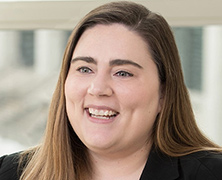My STEM Experience
STEM has always been an interest in my life. As a child, I saw one of my mother’s high school students have a seizure, which led me to wonder what caused it and how I might be able to help. Years later in graduate school, I researched cellular and molecular changes in the brain associated with learning and memory formation, and how those pathways are taken over by chronic drug use. Currently, I spend my days learning about the technology underlying the cutting-edge medical therapies my clients have developed and translating that technology into terms that help the general public understand it.
What I truly enjoy about my practice as a trial lawyer focusing on patent litigation and arbitration in the life sciences field is that my work allows me to continuously learn about and help protect numerous different scientific advances that can improve or save lives. My advocacy also allows me to help teach the broader public (including attorneys, judges, juries, and others) about these innovations and why they matter.
As for being a woman in a STEM career in 2020, it’s still an uphill slog. Experts may doubt your scientific acumen. For example, to draw on an experience a female colleague had a few years ago, an expert witness suggested that she might better understand what a surfactant (i.e., a soap) was if she had spent more time in the kitchen washing dishes. Opposing counsel may—in an example from my own experience—say on a meet and confer that you “sound just like my mom” when you ask for contact information. These types of slights are challenges that male colleagues likely will not face.
Find and know your support networks in advance, and don’t be afraid to lean on them to help you shake it off—or respond in a more remedial manner if you so desire and circumstances allow. I have been fortunate in that I have had multiple mentors and support networks throughout my career that have helped (and continue to help) me do just that. That said, I am heartened to see a greater focus and willingness to talk about these issues, which will, I hope, translate into reduced negative impact on future women in STEM careers.







